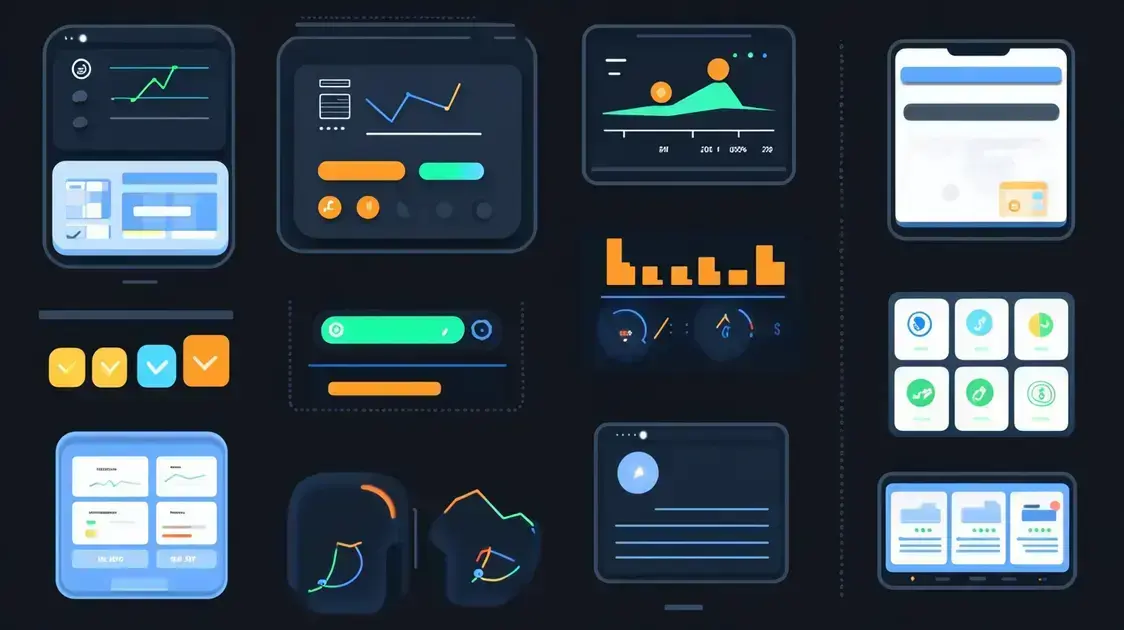Virtual financial planning assistants are transforming the way we approach personal finance. In today’s fast-paced world, managing finances can be overwhelming, but innovative assistants are here to help.
By leveraging technology, these tools provide tailored advice, budgeting support, and investment strategies. Imagine having a dedicated assistant available at your fingertips to steer you toward financial success.
This article will delve into the significance of these assistants, their key benefits, and tips on finding the ideal one for your needs.
Understanding a Virtual Financial Planning Assistant
A virtual financial planning assistant is a digital tool designed to help individuals and families manage their finances more effectively. These assistants leverage technology and algorithms to provide personalized financial advice and assistance.
With features that include budget tracking, investment recommendations, and expense management, they serve as a reliable ally in navigating complex financial landscapes.
How Virtual Financial Planning Assistants Work
These assistants gather data from various financial sources, allowing them to analyze your income, expenses, and savings goals. By continuously monitoring your financial habits, they can offer tailored advice that aligns with your objectives.
Types of Virtual Financial Planning Assistants
There are various types of virtual financial planning assistants. Some are standalone applications that require you to manually input your financial information. Others integrate with your bank accounts and automatically sync data for real-time analysis.
Who Can Benefit from a Virtual Financial Planning Assistant?
Anyone looking to improve their financial health can benefit from using a virtual financial planning assistant. Whether you’re a college student learning to budget for the first time, a family saving for a future purchase, or an individual planning for retirement, these tools can help guide your financial decisions.
The Importance of Security
As you consider using a virtual financial planning assistant, security should be a top priority. Reputable assistants employ robust security measures, such as data encryption and two-factor authentication, to protect your sensitive financial information.
Accessibility and Convenience
One of the key advantages of virtual financial planning assistants is their accessibility. Available on various devices, they allow you to manage your finances anytime, anywhere. This convenience empowers you to stay on top of your financial situation.
Benefits of Using a Virtual Financial Planning Assistant

Using a virtual financial planning assistant offers numerous advantages that can simplify managing your finances. These digital tools are designed to provide efficient and personalized financial guidance.
Time Savings
One of the greatest benefits of a virtual financial planning assistant is the significant time savings it provides. Tracking expenses, budgeting, and investment management can be time-consuming tasks. With automation, these assistants streamline financial processes, allowing you to focus on other important life aspects.
Personalized Financial Advice
Unlike generic financial advice, virtual financial planning assistants analyze your specific financial situation. They provide tailored recommendations to help you achieve your personal financial goals, whether saving for a vacation, purchasing a home, or planning for retirement.
Improved Financial Understanding
Using these assistants can enhance your understanding of financial concepts. They often provide educational resources alongside their services, helping you learn as you manage your finances. This improved knowledge equips you to make informed decisions about your financial future.
Real-Time Insights
With their ability to monitor your finances in real-time, virtual financial planning assistants deliver current insights about your spending habits, budget performance, and investment growth. This real-time feedback is crucial for making timely adjustments to your financial plan.
Accessibility and Convenience
Virtual financial planning assistants are accessible from various devices, such as smartphones, tablets, and computers. Their convenience allows you to monitor your finances whenever you like, making it easier to stay on track with your goals.
Cost-Effective Solutions
Many virtual financial planning assistants offer affordable pricing plans compared to traditional financial advisors. They often provide similar services, making financial planning accessible for individuals and families with varying budgets.
How to Choose the Right Virtual Financial Planning Assistant
Choosing the right virtual financial planning assistant is crucial for managing your finances effectively. Here are some key factors to consider during your selection process.
Identify Your Financial Needs
Before choosing a virtual financial planning assistant, take time to assess your financial needs. Are you looking for help with budgeting, investing, or retirement planning? Understanding your priorities will guide you in selecting an assistant that fits your requirements.
Evaluate Features and Tools
Different virtual financial planning assistants offer various features. Look for tools that provide budgeting, investment monitoring, and personalized advice. Check if the assistant integrates with banks and financial accounts for seamless management.
Consider User Experience
A user-friendly interface is essential for a positive experience. Make sure the platform is easy to navigate and visually appealing. Try out any available free trials to see how well the tool works for you.
Check for Security Measures
Ensure that the virtual financial planning assistant uses advanced security protocols, such as encryption and two-factor authentication. Your financial data must be protected from unauthorized access.
Read Reviews and Testimonials
Look for reviews and testimonials from other users to gauge the reliability of the assistant. Feedback from current or past users can give you insights into the tool’s effectiveness and customer support.
Assess Pricing Plans
Cost is an important factor in your decision. Compare pricing plans to find a virtual financial planning assistant that fits your budget. Many offer tiered pricing models based on the level of service, so choose one that aligns with your financial capability.
Top Features of a Virtual Financial Planning Assistant

A virtual financial planning assistant offers a range of features designed to help you manage your finances effectively. Identifying the top features can help you choose the right assistant for your needs.
Budgeting Tools
One essential feature of a virtual financial planning assistant is effective budgeting tools. These tools help you create budgets based on your income and expenses, enabling you to track your spending habits and stay within financial limits.
Automated Expense Tracking
Automated expense tracking is another critical feature. The assistant can connect with your bank accounts and automatically categorize transactions, giving you real-time insights into your spending patterns.
Investment Monitoring
Investment monitoring capabilities are vital for those looking to grow their wealth. A good virtual financial planning assistant tracks the performance of your investments, providing updates and recommendations based on market changes.
Customized Financial Plans
These assistants often offer personalized financial plans tailored to your goals. Whether saving for a house, retirement, or education, these plans help you stay focused and motivated towards achieving your financial objectives.
Goal Setting and Progress Tracking
A vital feature is goal setting and progress tracking. You can set specific financial goals and monitor your progress over time. This feature helps keep you accountable and on track to meet your targets.
User-Friendly Interface
Lastly, a user-friendly interface is a must-have feature. The assistant should be easy to navigate, with a clear layout that makes accessing your financial information simple and intuitive.
Common Misconceptions About Virtual Financial Planning Assistants
There are several common misconceptions about virtual financial planning assistants that can deter potential users from taking advantage of their benefits. Let’s clarify these misunderstandings.
They Are Only for the Wealthy
Many people believe that virtual financial planning assistants are only for wealthy individuals. In reality, these tools are designed to assist anyone looking to improve their financial situation, regardless of their income level. They provide valuable guidance for budgeting, saving, and investing.
They Replace Financial Advisors
Another misconception is that virtual financial planning assistants replace traditional financial advisors. While they offer some similar services, they complement rather than replace personalized financial advice. These assistants can help manage routine tasks, allowing human advisors to focus on more complex financial strategies.
They Are Complicated to Use
Some people think that using a virtual financial planning assistant requires advanced financial knowledge or technical skills. However, most tools are user-friendly and designed for individuals at all skill levels. With simple interfaces and helpful tutorials, anyone can learn to use them.
They Don’t Provide Accurate Information
Another common myth is that virtual financial planning assistants do not provide accurate or reliable information. These tools use advanced algorithms and data analysis to offer precise recommendations based on your specific financial circumstances, ensuring you receive informed advice.
They Don’t Ensure Data Security
Many users worry about the security of their financial data when using these assistants. Reputable virtual financial planning assistants implement strong security measures, such as encryption and two-factor authentication, to protect user data from unauthorized access.
They Are Not Worth the Cost
Some individuals believe that virtual financial planning assistants are not worth the investment. However, for many, the cost savings and financial benefits they provide over time far outweigh the initial expense. By helping manage expenses and investments, they can lead to greater financial stability.
The Future of Virtual Financial Planning Assistants

The future of virtual financial planning assistants looks bright and full of potential. As technology continues to evolve, these tools are likely to become even more sophisticated and user-friendly.
Artificial Intelligence Integration
One major trend is the integration of artificial intelligence (AI). Future assistants will likely harness AI to provide more personalized advice by analyzing your spending habits, financial goals, and market trends. This level of customization can enhance decision-making and help users achieve their financial objectives more effectively.
Enhanced User Experience
As competition increases, companies will focus on creating a more enhanced user experience. Future assistants will offer intuitive interfaces, making it simple for users to access their financial information and insights. This ease of use will attract more individuals to adopt these tools.
More Comprehensive Services
The range of services provided by virtual financial planning assistants is expected to expand. Future versions may include features like estate planning, tax optimization, and personalized investment strategies that cover a broader spectrum of financial planning needs.
Increased Accessibility
Technology is making virtual financial planning assistants more accessible to a wider audience. Mobile applications will allow users to manage their finances from anywhere, thus bringing financial planning to the palms of users’ hands. This accessibility is particularly appealing to younger generations who prefer digital tools.
Focus on Financial Education
Future assistants might place a strong emphasis on financial education. By providing relevant resources, tutorials, and tips, they can help users become more informed about their finances and make wiser financial choices. Education can empower individuals and improve overall financial literacy.
Collaboration with Traditional Advisors
In the future, virtual financial planning assistants may collaborate more closely with traditional financial advisors. This partnership can result in a hybrid approach, where automated tools handle routine tasks while advisors focus on more intricate financial strategies. This teamwork can benefit users by combining the strengths of both systems.
FAQ – Frequently Asked Questions about Virtual Financial Planning Assistants
What is a virtual financial planning assistant?
A virtual financial planning assistant is a digital tool designed to help individuals manage their finances by providing budgeting, investment tracking, and personalized financial advice.
Who can benefit from using a virtual financial planning assistant?
Anyone looking to improve their financial health can benefit, whether you are a student, a family planning for the future, or an individual preparing for retirement.
Are virtual financial planning assistants only for wealthy individuals?
No, virtual financial planning assistants are designed for everyone, regardless of income level. They can help manage budgets and financial planning for all users.
Can a virtual financial planning assistant replace a financial advisor?
While they can perform many similar functions, virtual financial planning assistants complement traditional financial advisors rather than replace them, especially for complex strategies.
How secure is my financial data with a virtual financial planning assistant?
Reputable virtual financial planning assistants use strong security measures, including encryption and two-factor authentication, to protect your sensitive financial information.
What features should I look for in a virtual financial planning assistant?
Look for features such as budgeting tools, automated expense tracking, investment monitoring, and customized financial plans to ensure the assistant meets your needs.